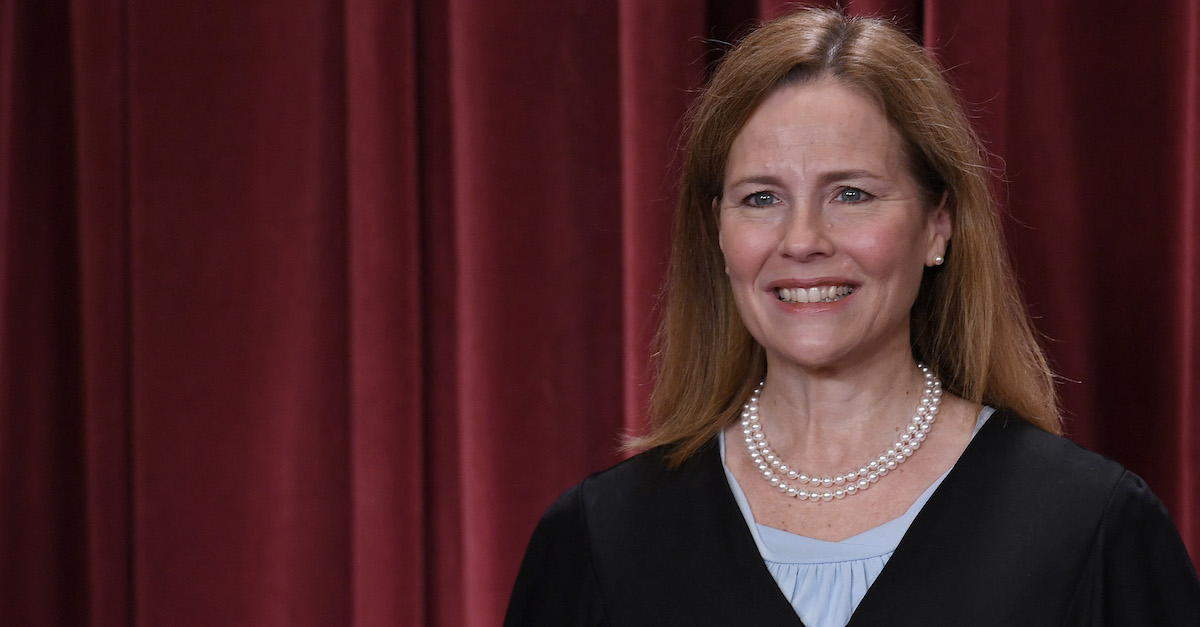
Associate U.S. Supreme Court Justice Amy Coney Barrett poses for the official photo at the Supreme Court in Washington, DC on October 7, 2022. (OLIVIER DOULIERY/AFP via Getty Images)
U.S. Supreme Court Justice Amy Coney Barrett appears to have prompted a significant concession from one of Donald Trump’s attorneys about the nature of some of the charges he faces in Washington, D.C., federal court over various efforts to overturn the 2020 election results.
During oral arguments Thursday morning in the case stylized as Trump v. United States, several members of the court took the opportunity to try and distinguish what might be considered the president’s private conduct from his official conduct. During the proceedings, Trump’s attorney D. John Sauer and some of the justices came to agree that there is a difference between such conduct, at least in theory, and that the former would not be entitled to immunity.
Barrett, however, got Sauer to agree with her on a few points that likely had special counsel Jack Smith happy with the end result.
“You concede that private acts don’t get immunity?” the justice asked.
“We do,” Trump’s attorney replied.
Barrett went on to read from the government’s early April response brief filed with the court, which characterizes several of Trump’s alleged actions as “private conduct” meant to achieve a “private aim.”
“Petitioner turned to a private attorney who ‘was willing to spread knowingly false claims’ of election fraud to spearhead his challenges to the election results,” the justice read before asking: “Private?”
To which Sauer replied: “As alleged, I mean, we dispute the allegation, but that sounds private.”
With the intonation of a box ticked, Barrett mimicked the response. “Sounds private.”
Then she read from Smith’s brief again: “Petitioner conspired with another private attorney who caused the filing in court of a ‘verification’ signed by petitioner that contained false allegations to support a challenge.”
“Also sounds private,” Sauer admitted.
This time, the justice did not respond, but barreled ahead, reciting the government’s brief yet again, and slightly paraphrasing.
“Three private actors — two attorneys (including those mentioned above) and a political consultant — helped implement a plan to submit fraudulent slates of presidential electors to obstruct the certification proceeding, and petitioner and a co-conspirator attorney directed that effort,” Barrett said.
Sauer, this time, offered slight pushback about how fast the justice read the alleged conduct but ultimately said he believed it was private.
“So those acts you would not dispute?” Barrett drilled ahead. “Those were private and you wouldn’t raise a claim that they were official.”
Again, Sauer agreed: “As characterized.”
The 45th president’s attorney quickly then moved to rattle off a series of actions he believed would be considered official acts like meeting with the U.S. Department of Justice, communicating with Congress, and communicating with the public.
The exchange was quickly picked up on as a significant development with an upshot that might not bode well for Trump’s position.
“Justice Barrett just got Sauer to concede that there are private acts alleged in the indictment — so that the trial could go forward at least in part,” University of Texas Law Professor Steve Vladeck wrote on the social media platform X (formerly Twitter).
Trump’s attorney then tried to salvage some of those preceding admissions for his client with an appeal to procedural considerations.
Asked by Chief Justice John Roberts what the court should make of an indictment that contains both private and official conduct, the defendant’s attorney had two suggestions leading in the same direction.
Sauer said the high court should either hash out the issues themselves and remand to the lower court or simply remand for the lower court to determine how to deal with those issues — as long as the court’s order purges all of the official conduct from the indictment.
Perhaps feigning something not entirely unlike incredulity, Roberts characterized that idea as “like a one-legged stool.”
“If you say you have to expunge the official part, how does that go forward?” the chief justice asked.
Trump’s attorney, after some hedging, replied: “This particular indictment … we don’t believe it would be able to go forward.”
Have a tip we should know? [email protected]

.jpeg) 1 week ago
16
1 week ago
16











 English (US)
English (US)